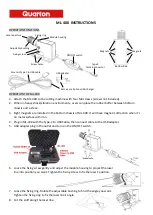
2600S-901-01 Rev. C / January 2008
Return to
12-57
Series 2600 System SourceMeter® Instruments Reference Manual
Section 12: Instrument Control Library
Remarks
• The Series 2600 uses a ratio metric A/D conversion technique. To ensure
accuracy of readings, the instrument must periodically obtain fresh
measurements of its internal ground and voltage reference. The time interval
between needing to update these reference measurements is determined by
the integration aperture being used for measurements. Separate reference and
zero measurements are used for each aperture.
• By default, the instrument automatically checks these reference measurements
whenever a signal measurement is made. If the reference measurements have
expired when a signal measurement is made, the instrument will automatically
take two more A/D conversions, one for the reference and one for the zero,
before returning the result. Thus, occasionally, a measurement takes longer
than normal.
This extra time can cause problems in sweeps and other test sequences in
which measurement timing is critical. To avoid the extra time for the reference
measurements in these situations, the
smuX.measure.autozero
attribute can
be used to disable the automatic reference measurements. Keep in mind that
with automatic reference measurements disabled, the instrument may gradually
drift out of specification.
To minimize the drift, a reference and zero measurement should be made just
prior to the critical test sequence.
The smuX.AUTOZERO_ONCE
setting can be
used to force a refresh of the reference and zero measurements used for the
current aperture setting.
• Autozero reference measurements for the last 5 used NPLC settings are stored
in a reference cache. If an NPLC setting is selected and an entry for it is not in
the cache, the oldest (least recently used) entry will be discarded to make room
for the new entry.
Example
Perform autozero once for SMU A:
smua.measure.autozero = smua.AUTOZERO_ONCE
smuX.measure.calibrateY
X = SMU channel (a or b)
Y = SMU measure function (v or i)
where v = voltage, i = current
Function
Generates and activates new measurement calibration constants.
Usage
smuX.measure.calibrateY(range, cp1measured, cp1reference,
cp2measured, cp2reference)
range
The measurement range to calibrate.
cp1measured
The value measured by this SMU for
calibration point 1.
cp1reference
The reference measurement for calibration
point 1 as measured externally.
cp2measured
T
he value measured by this SMU for calibration
point
2.
cp2reference
The reference measurement for calibration
measured
externally.
















































